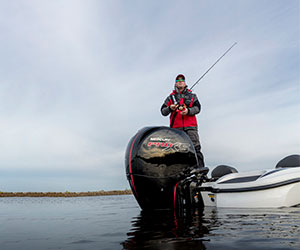
What's New?

Rain didn’t dampen the spirits of 14 Casting Couples contestants in the season finale at Magician Lake last weekend.

Man, you talk about a close finish! It doesn’t get much closer than what the Arjay’s Classic experienced at Paw Paw Lake on Saturday.

New Gear
The ClapTail™ 110 is a topwater bait with a metal prop and back blade that collide when retrieved, producing a unique two-tone fish-attracting sound.
Newsflash
Big Bass Dominate Singles Open at Pine/Stone Lakes
- Details
Michiana Singles Report
Ten Michiana Singles anglers dodged severe weather Sunday at Pine and Stone lakes in LaPorte, Ind. but still carried plenty of big fish to scales.
There were two bass weighing more than 5 pounds weighed in and three limits caught.

Loren Crosbie won it all with 19.66 pounds that included the second biggest bass, a 5.12-pound largemouth. Crosbie used Chatterbaits on the main lake to take home $210.

Bruce Carman had a limit totaling 16 pounds caught on Rapala DT6 crankbaits while fishing the main lake. He pocketed $100.

Jason Fowler also had a limit of five bass totaling 13.52 pounds, good for $50. Fowler said he lost two that were close to five pounds first thing in the morning while using a jerkbait.

Rick Kedik was fourth with two fish weighing 8.81pounds caught on swimbaits.

Big bass honors went to Steve Martin with a monster 5.56-pound largemouth. Martin used a soft plastic minnow and jig to catch the big fish and $45.
The next Singles event is Thursday, April 10th at Maggies landing on the St. Joseph River. Hours are 5:30 pm – 9 pm and entry fee is $55.
Contact Rick 269-240-4917.
Natural Fish Kills May Be Common During Spring Thaw
- Details
MDNR Report
As ice and snow cover melt on Michiana lakes this spring, you may see dead fish or other aquatic animals. Given the return to a more “normal” Michigan winter this year — with more cold days and near-average snowfall across the state — you may notice more dead fish than you have in the past few years.
While such sights can be startling, the DNR reminds everyone that it is normal for winter conditions to cause some mortality of fish and other creatures such as turtles, frogs, toads and crayfish.
“Winterkill is the most common type of fish kill," said Aaron Switzer, Michigan DNR Fish Production Program manager. "It can be particularly common in shallow lakes, ponds, streams and canals during seasonal changes. It’s a natural phenomenon, and these kills are localized. They typically do not affect the overall health of fish populations or fishing quality.”
Shallow lakes with a large amount of aquatic vegetation and soft bottoms are more prone to winterkill, particularly when a deep snowpack reduces sunlight for the plants. Canals in urban areas also are quite susceptible, due to the large amounts of nutrient runoff and pollution from roads, lawns and septic systems that flow into these areas, especially after large storm events.
Page 5 of 267













Connect With Us